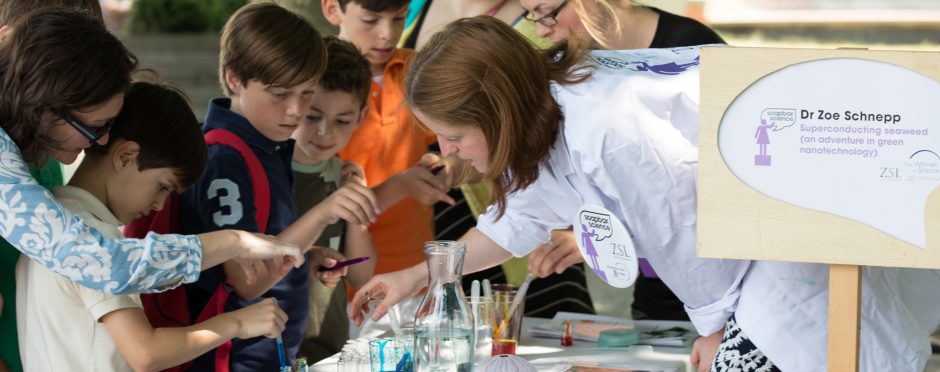 I am Jiawen Sun, a PhD student in High Performance Distributed Computing at the School of Electronics, Electrical Engineering and Computer Science, Queen’s University Belfast. My field of research is large scale graph analytics in big data analytics. This blog tries to tell people how and why I decided to go for a PhD in the UK and how big data in graph analytics has an exciting potential to change our lives for the better.
I am Jiawen Sun, a PhD student in High Performance Distributed Computing at the School of Electronics, Electrical Engineering and Computer Science, Queen’s University Belfast. My field of research is large scale graph analytics in big data analytics. This blog tries to tell people how and why I decided to go for a PhD in the UK and how big data in graph analytics has an exciting potential to change our lives for the better.
You can catch Jiawen on her soapbox at the Belfast event on 24th June where she will give a talk called: “How big data analytics could help us to know our life better”.
SS: How did you get to your current position?
JS: When I got my master degree in Mobile & Wireless Network, my grandma encouraged me to go for a PhD. My grandma is my mentor to guide me on the science road. At first, I wanted to have a job instead of further study. While searching for a job, I realised that I was basically looking for a challenging one, like researching new technology to improve our quality of life. So, the PhD turned out to be a better option. In the beginning, I looked for PhD positions in China, but also started to realise that an overseas experience would be more interesting. After my wide search to work with leading experts, I started my PhD with Queen’s University Belfast. My research is about graph analytics, and I find it exciting because it has the potential to help people understand their lives better in a positive way, e.g., you could use social network analytics to find out more quickly what the popular news stories or topics are at a given time. So, I am here.


(Left is a night view of my hometown— Tianjin, China. Right is my grandma)
SS: What, or who, inspired you to get a career in science?
JS: My family believes that science is essential in changing the world. They always say, “Science and technology are primary productive forces.” When I was very young, they tried to give me a lot of magazines and books about science to read and when I started to learn more about science, I had more of an interest in it. Now in Queen’s, I learn a lot from my supervisors and classmates, e.g., passion, patience and a cautious attitude in research. Their behavior has a profound influence on me.
SS: What is the most fascinating aspect of your research?
JS: Graph analytics in data analytics is a relatively novel approach. In general, the volume of the data is very huge, so we need to use our limited resources in an effective way. I am fascinated by this research in particular because it offers opportunities to improve or change many aspects of our daily lives, such as: predicting and managing climate and weather; detecting health issues of individuals and enabling timely treatment; and social network analytics. As a research student, I like the freedom in science- whatever your idea, you can explore, learn, research and possibly discover new things. I like the creativity and endless opportunities for enriching our lives through data analytics.

(Social Network Analytics)
SS: What attracted you to Soapbox Science in the first place?
JS: I enjoy sharing my knowledge, thoughts and ideas with people. Sometimes people are surprised when I tell them that my main subject is computer science. They think the computer science, graph analytics and data analytics are very hard or complex to learn. In fact, computer science is not very complicated at all- once people have some basic background knowledge, they will easily pick it up and see how interesting it is. It makes me feel good to highlight exciting new research topics or applications, or positive outcomes in daily life. I like to show people how data is being collected and then analysed from our daily activities and how these analytics could help us to understand our lives or make changes for the better.
SS: Sum up in one word your expectations for the day – excitement? fear? thrill? Anticipation?
JS: Excitement, and maybe a little anticipation.
SS: If you could change one thing about the scientific culture right now, what would it be?
JS: I would join together academia and industry, because a lot of researchers in universities are only focusing on their own research- they do not consider how to transfer their ideas or research into real life. People in industry are always having fantastic ideas, but they may not be fully aware of the research that is happening in universities. If we could have a joint program, to share our ideas and skills towards one goal or one project, we could create a strong professional approach to doing our work, with less effort.
SS: What would be your top recommendation to a female PhD student considering pursuing a career in academia?
JS: At first, find what your interesting topic is, and ask yourself, do you really want to do research? A scientist does not have to be male or female. We need many women to put themselves forward without hesitation to do research. From my own experience, everyone will love the atmosphere of research departments, and personal objectives can only be dictated by what the science demands. Research work is very rewarding, builds your confidence and contributes to the science community.
